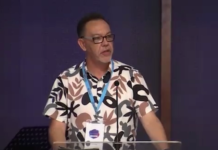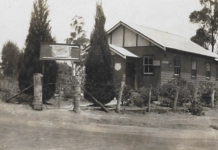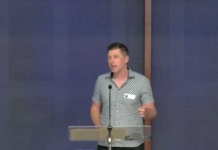
A personal confession at this point! Earlier in ministry I was given a nickname: “The Rushman”. I still wrestle with my pace today. As I slogged through my one-hour commute to work the other morning, I became frustrated when a couple of crawling cars held up the line of traffic ahead of me. So, as I write this piece, let me make a note to self: listen to the old saying – “physician heal thyself!”
In much of modern culture, a constant wail arises about the “pace” of life. Indeed, for many of us, pace has accelerated to an intolerable level. A 1999 research study compared the pace of life in 31 countries. [1] It found that “Overall, pace of life was fastest in Japan and the countries of Western Europe and was slowest in economically undeveloped countries. The pace was significantly faster in colder climates, economically productive countries, and in individualistic cultures. Faster places also tended to have higher rates of death from coronary heart disease, higher smoking rates, and greater subjective well-being.” [2] “Pace” is not so much about over-functioning, per se. It is more about the speed at which we operate. “Pace” maybe uncovered via features such as the speed at which we walk, valiant efforts we make to ‘multi-task’, [3] trying to do more and more in the same amount of time, the rate and level of change occurring and how impatient we become if we are held up. There are even quirky online surveys to assess how fast-paced we are. [4]
Christians leaders are liable just as much as others to be squeezed into the world’s ‘mould’ (Romans 12:12) when it comes to pace. It is a ‘mould’ that places undue strain upon ourselves, can wound other people, and makes us liable to behave in less than godly ways. We can become discourteous, demanding, pushy, exhausted and frustrated, treating others in ways we would not wish to be treated ourselves.
The question of ‘pace’ for a Christian leader is an important one. By default, we can fall into the grip of the misguided adage from some years ago: “I’d rather burn out than rust.” For example, though a very high capacity leader, Bill Hybels discovered to his detriment that his pace was too high. At one stage, earlier on in his ministry, he came close to the edge of burnout because his pace was unsustainable. [5] Eugene Petersen encourages pastors to walk a “long obedience in the same direction”, posing the question in a tweet, “How can I lead people into the quiet place beside the still waters … IF I am in perpetual motion?” (4/11/17). An unsustainable leadership pace relates to the issues of burnout and premature departure from pastoral ministry. They continue to be a challenge, [6] at least sometimes triggered by too high a pace of life by pastors and church leaders.
So, how do we think about the issue of pace and leadership? Let’s consider the following
- Working at a pace that damages our ‘self’, our families and our church’s well-being is sometimes driven by sinful motivations or unexamined weaknesses. For instance, is my pace too high because I am seeking to please others rather than seeking to work on God’s agenda? Does my security come more from being seen as important because I am busy, rather than because I am ‘in Christ’? Am I meeting some need within myself – avoidance of issues I do not want to face, unhealthy fear of failure, meeting the expectations of others – by being busy, more than I am serving others by working well? While these motivations are not always the case, examining the factors driving us into an unsustainable pace is a useful exercise. We are to know ourselves well if we are to serve others well.
- Working at too high a pace for too long will mean that we make unnecessary mistakes. There are two causes for this: when we rush we are more prone to miss things or not think/pray things through thoroughly; our processes tend to ‘skimming’. But more than that, especially as we get older, too high a pace wears us out and we function less effectively as a result. Wisely did Jesus say to the disciples on more than one occasion as crowds pressed him, “Come with me by yourselves to a quiet place and get some rest.” (Mark 6:31)
- Unsustainable pace is a poor stewardship of our time, energy, and gifts. Each believer has gifts for the good of all in the body of Christ (Romans 12:4 – 8). Yet each of us only has so much time and energy to give. Stewardship is the wise dispensing of our time, energy and gifts at levels appropriate to each situation and person we are leading and serving. Too high a pace means that we may disperse our time, gifts and energy too widely and shallowly because we are moving too quickly. Moving at too fast a pace results in not giving to others the attention they may need, or the time they deserve, because we are already focussed internally on the next task. We have a diminished capacity to have a genuine ministry of ‘presence’ with people. A warning signal for this might be if people regularly say things to us such as “I don’t like bothering you because you are so busy”, or, “Are you listening?”
- Too high a pace may mean that we are not trusting God sufficiently. Do we believe in heart level as well as cognitive level that the Lord can do without us as leaders? Do we accept that the Sabbath principle is there for good reason? Can we live out of a core conviction that there is an eternal “now” within which we operate (Hebrews 4:1 – 13), rather than just the compression of the time-limited “saeculum”. [7] Can we trust God is at work when we slow down or rest?
- Our pace will need to vary from time to time depending upon appropriate workload demands. Just as a car may need to be driven at a faster or slower pace depending on the situation, so too will our pace of work need to be adjusted or changed. However, if this continued, it would be unsustainable. To expect, set or demand a monotone pace that is inflexibly low is a failure of leadership skill. Great biblical leaders varied their pace according to need and capacity. One example of this might be Paul who, learning to be content in plenty or in need (Philippians 4:1 – 12), also had to contend with periods of high activity (Acts 16:6 – 10; 18:1 – 20:6); overwork and stress (2 Cor. 6:4 10); periods of “waiting” (Acts 17:16) when, although still active, he appears to have worked at a slower pace; years of imprisonment, with little capacity to do much at all beyond prayer, writing and witness (Acts 16:16ff; 22:22 – 28:30). The capacity and willingness to vary our pace appropriately is a necessary leadership ability.
- Each of us has a different capacity to handle pace. We must understand where we sit on that scale. Some of us have a greater ability to operate well and safely at a high pace for longer than others. Some of us have less of capacity. Again, this is an issue of knowing ourselves and our capacity so that we operate at a level commensurate with the grace given us by God.
- The answer to the challenge of pace is not an either/or one. Simplistic responses to the pressure to go too fast in life and ministry are not viable. If we wish to reach the culture in which we find ourselves in with the gospel we cannot simply withdraw, nor can we merely adopt the pressured pace of life we see around us. A ‘Martha/Mary’ dichotomy is not the answer. As Christian leaders, we are called to find a pace that (i) is personally sustainable over a lifetime of ministry (ii) sets up an alternative model of living for the secular world to observe and for Christians to emulate; (iii) enables us to be genuinely present with people while still getting done the tasks that are appropriately on our plate; and (iv) is reinforced by a rhythmic responsiveness to the unexpected and to exponential change. It is a balance that calls for continual, agile juggling not black and white rigidity.
Pace: it is a challenge for us all. But as with all else, Jesus is our model. Jesus ‘paced’ his activity rhythmically. If he needed to, so do we. We lead best when daily, weekly, monthly, yearly and life-span rhythmic patterns of sustainable pace are put in place. There is a time for everything in God’s purposes (Ecclesiastes 3:1 – 12). Undue haste or pace will not create any more time to fulfil them (Matthew 6:25 – 27).
[1] Robert V. Levine, Ara Norenzayan, “The Pace of Life in 31 Countries”, The Journal of Cross-Cultural Psychology, March 1, 1999.
[2] Article abstract, accessed http://journals.sagepub.com/doi/abs/10.1177/0022022199030002003
[3] Efforts which research has shown actually diminish our effectiveness: https://www.thoughtco.com/can-people-really-multitask-1206398
[4] http://www.richardwiseman.com/quirkology/pace.html
[5] Bill Hybels, Courageous Leadership, Zondervan, Grand Rapids, Michigan, US, (2002), 239 – 246.
[6] One in three US pastors is in danger of burnout, according to Barna and Pepperdine University report The State of Pastors, 10, 2017. The 2015 – 16 survey of the well-being of Australian Baptist pastors reports that 18% of pastors indicate their sustainability was low or very low; 20% indicated they had sought help for mental or emotional issues in the previous two years; 18% claimed they worked 60 hours per week or more. Sustainable Leadership in the Australian Baptist Church, 9, 17, 8. NCLS Commissioned Research (2016).
[7] The word “secular” derives originally from the Latin “saeculum”, meaning of time as opposed to eternity. http://www.dictionary.com/browse/secular?s=ts
One consequence of the emphasis upon the secular at the expense of the sacred is, in my view, a pervasive sense that we must cram everything into the brief life-span on earth, with the tendency to compress and speed up activity. This might be seen in the title of lists such as the 1001 Movies You Must See Before You Die, or the 1001 Books …. Places …. Such thinking as well as the advent of computers has tended to speed up our pace to the frequently unsustainable levels we have today.





































